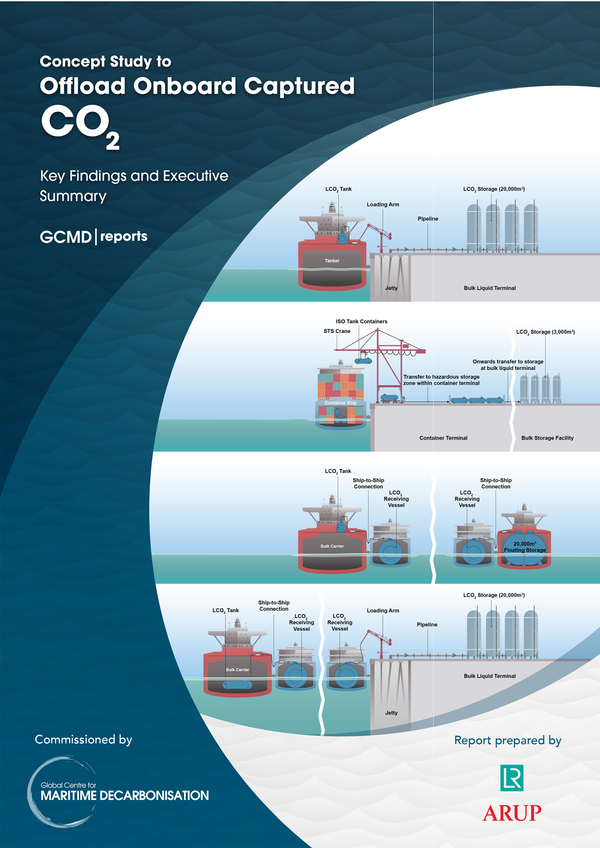
A study commissioned by the Global Centre for Maritime Decarbonisation (GCMD), in collaboration with Lloyd’s Register and ARUP, has identified low port readiness as a major hurdle bottlenecking the adoption of onboard carbon capture and storage (OCCS) systems as a practicable decarbonization solution.
Whilst the technologies required for offloading onboard captured CO2 exist at high levels of maturity, safe operationalisation of captured CO2 transfer by trained personnel has not been demonstrated.
The report, titled “Concept study to offload onboard captured CO₂,” found that while a limited number of ports possess the infrastructure to offload liquefied CO2 (LCO2), they are primarily designed to handle food-grade CO2. The higher purity standards that accompany this use limits the interoperability of facilities to handle onboard captured CO2.
The study examined over 10 planned LCO2 related infrastructure projects worldwide. Located near, or with transport links from, CO2-emitting industrial clusters, these projects are likely to handle much larger volumes of captured CO2 than that from OCCS systems; port infrastructure needed for offloading, storing and transporting onboard captured CO2 will likely need to be integrated with these projects for economies of scale.
However, as many of such projects remain in concept phase and have not reached final investment decision (FID), ports have not proceeded with offloading infrastructure investments. This chicken-and-egg dilemma highlights the overall infancy of the carbon value chain.
Furthermore, introducing LCO2 offloading into already complex port operations will likely impact port efficiency and operational performance. The need for additional buffer zones to address the safety concerns of LCO2 handling and storage will also add to existing space constraints at ports and terminals.
By systematically considering the needs of the entire value chain, this study evaluated four concept configurations of offloading infrastructure from a possible 162 scenarios, identified the operational standards and safety guidelines for handling LCO2, developed models for the quantification of costs for scaled-up infrastructure, articulated manpower competency frameworks for offloading operations, and analysed the potential regulatory scenarios needed to address the current uncertainties surrounding LCO2 offloading from OCCS.
The study determined that captured CO2 in its liquefied form is likely the most efficient and cost-effective option for onboard storage and transport. Based on this, the study shortlisted four concepts covering key offloading modalities, such as ship-to-ship and ship-to-shore, serving as building blocks that can be combined to cover a wider range of offloading concepts.
In ranking the operability of these concepts, the study identified ship-to-ship and ship-to-shore transfers using an intermediate LCO2 receiving vessel as the most promising modalities for offloading at scale, with captured CO2 eventually sequestered or used as feedstock for manufacturing synthetic fuels.
Ship-to-terminal transfer of captured CO2 stored in ISO tank containers was identified to be more compatible at smaller scales and for end uses that require higher grades of CO2. This modality of transfer is also most compatible with existing port infrastructure and therefore easier to pilot today.
Handling LCO2 onboard presents a unique set of safety challenges not commonly encountered when handling fuels in shipping. The study offers an in-depth examination of hazards, such as asphyxiation and toxicity, if a leak or a loss of containment takes place.
Unique to CO2 is evaluation of its storage at conditions near its triple point, where the gaseous, liquid and solid phases of CO2 co-exist. Storage at or near the triple point is sensitive to impurities, and minor changes in temperature and pressure can lead to a phase change from liquid to solid CO2, leading to hazardous situations, such as blockage in pipes and build-up of pressure.
To address these hazards, a series of safety studies, including a Hazard Identification (HAZID) of offloading, Simultaneous Operations (SIMOPS) and a coarse Quantitative Risk Analysis (QRA), were conducted and mitigation measures and emergency response procedures articulated for handling LCO2.
The nine-month long study complements GCMD’s Project REMARCCABLE (Realising Maritime Carbon Capture to demonstrate the Ability to Lower Emissions) by addressing the feasibility of OCCS as a practicable, end-to-end solution at scale.



